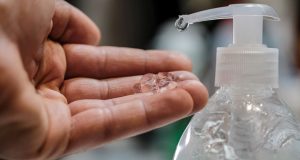Maintaining hygiene and preventing the spread of bacteria and disease is key in the hospital environment, where vulnerable patients are constantly at risk and high traffic allows for bacterial infection to spread quickly. HCAIs (Healthcare Associated Infections) were estimated by the National Audit Office to cost the NHS “at least £1 billion”; “each avoidable healthcare associated infection costs the NHS £4,300” on average. Therefore, each case of an HCAI which is prevented saves a significant amount of money and can improve the recovery of patients within a hospital. On the other hand, a lack of attention to HCAI prevention can have catastrophic effects: the World Health Organisation reports that “Every day, HCAI results in prolonged hospital stays, long-term disability…and unnecessary deaths”.
Optimising healthcare interiors to support hygiene
Healthcare centres already go through daily cleaning processes in their efforts to maintain hygiene standards. The NHS requires that all surfaces should be “visibly clean”, and walls and floors are cleaned frequently with antibacterial cleaning solutions. Whilst this is an important part of the hygiene process, it is hampered by the current interior design and facilities of many healthcare centres. These hospitals, care homes and doctor’s surgeries contain outdated interiors which make cleaning to the high standards required unnecessarily difficult.

Withstanding daily cleaning
The daily cleaning required in hospitals and other healthcare centres can wear down the interior of a building quickly if the proper protections systems are not in place. Solutions to this problem have been developed in the form of specialist wall coatings as well as protection panelling. A representative of Bagnalls, a painting and decorating company who carries out the installation of specialist coatings for the NHS, commented that it is essential that these products “can withstand daily cleaning for many years”. This applies both to the specification of the product itself and to the methods used to install the products – both must take into consideration the specific needs of healthcare centres.
Specialist wall coatings
These specialist wall coatings often come with antibacterial properties which further aid in creating a hygienic environment in hospitals. These “hygienic coatings” often contain ingredients such as silver ions which inhibit the growth of bacteria and mould. In addition to allowing the building to withstand daily cleaning, these coatings therefore discourage bacteria and infections constantly and contribute towards an overall more hygienic environment. This may be essential in reducing the number and impact of HCAIs in the future, as it reduces the spread of infection in between cleaning periods.
Wall and door protection panelling
Another interior design option for maintaining hygiene in hospitals is protection panelling. Like the specialist coatings, these protect a building from the damage which can be caused to a healthcare centre interior over time, yet these products also help maintain hygiene through the PVCu materials which they are manufactured from, which discourage the growth of bacteria.
 Patient hand hygiene
Patient hand hygiene
Despite studies showing that the transfer of micro-organisms between hands within hospitals is a major contributor to the spread of disease, patient hand hygiene remains poor in most healthcare centres. Placing hand sanitisers, washbasins and other handwashing facilities in healthcare entrances and waiting rooms is a great way to combat this, allowing for a quick and easy way for patients to improve their hand hygiene and contribute to the safety of a hospital. It’s also important to increase education and information about these through posters and video messages on waiting room TVs. These should educate people on the importance of hand hygiene in a way that is quick and engaging – in a busy hospital environment, visitors and patients won’t wait around to read lengthy messages.
Implementing these tips can be a great way to encourage the decrease of HCAIs, however they do not replace the need for regular cleaning of healthcare centres and normal hygiene procedure.
Bagnalls provide expert installation of hygiene coatings to the NHS and other hospitals.





